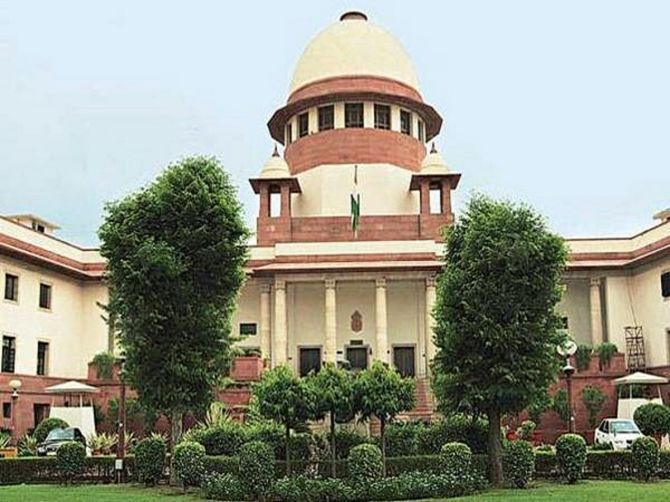The Supreme Court on Tuesday transferred to the Delhi high court public interest litigations pending before it challenging the Centre's 'Agnipath' scheme for recruitment in the armed forces, and also requested the high court to ensure their 'expeditious disposal'.

During the hearing, one of the petitioners said his plea has a pan-India effect to which a three-judge bench asserted that pan-India does not mean the apex court will have to hear everything, adding it would be appropriate to have a considered view of the Delhi high court.
A bench of Justices D Y Chandrachud, Surya Kant, and A S Bopanna also asked the high courts of Kerala, Punjab and Haryana, Patna, and Uttarakhand to transfer the PILs pending before them against the 'Agnipath' scheme to the Delhi high court or keep it pending till a decision by it if the petitioners before the high courts so desire.
"In this backdrop, we are of the view the three writ petitions which have been instituted before this court should be transferred to the Delhi high court and renumbered under Article 226 of the Constitution.
"Ordinarily, we would have disposed off these petitions by granting liberty to the petitioners to move the Delhi high court afresh but we are desisting from following that course of action, to obviate any further delay in withdrawal of the petitions and filing of fresh petitions."
"We request the Delhi high court for expeditious disposal of the writ petitions after hearing the parties," the bench said, adding the Union of India shall ensure that copy of this order is immediately placed before the registrar judicial of the concerned high courts.
The bench directed the Registrar (judicial) of the top court shall accordingly transmit the record of the three writ petitions filed under Article 32 of the Constitution to his counterpart in the Delhi high court so that the petitions can be renumbered and be placed before the appropriate bench in terms of the appropriate directions of the Chief Justice of the Delhi high court.
The top court said it is being apprised of the fact that several petitions have been also filed before the high courts of Kerala, Patna, Punjab and Haryana, and Uttarakhand.
'It would be appropriate to direct that the copy of the present order be placed on record of the proceedings in each of the high courts by the counsel appearing on behalf of Union of India(UOI) in those proceedings,' it added.
The bench said the high courts shall furnish an option to the petitioners who have moved those petitions under Article 226 to either have their petitions transferred in pursuance of the present directions or in the alternative keep those pending by granting liberty to intervene in the proceedings before the Delhi high court.
'In the event, that the petitioners desire the former course of action, the proceedings before each high court shall be transferred to the Delhi high court for being heard together with the pending proceedings and the proceedings which are being transferred as a result of this order,' it said.
The bench said should the petitioners not desire to follow that course of action, the high courts shall keep those petitions pending and petitioners will be at liberty to intervene before the Delhi high court so that they have full opportunity to espouse their contentions before it in the pending proceedings.
'In the event that any petitions are filed hereafter the same course of action which we have indicated in the above terms shall be followed by the concerned high court.'
It said that copy of this order be placed on record and all the petitioners would be at liberty to move the applications before the Delhi high court.
At the outset, advocate Kumud Lata Singh appearing for one Harsh Ajay Singh said they have challenged the Centre's decision of the 'Agnipath' scheme meant for recruitment in the Armed forces.
Solicitor General Tushar Mehta, appearing for the Centre, said several petitions have been filed across different states and it would be appropriate if all the petitions are heard by the top court or any one high court.
He said that a substantive petition is pending before the Delhi high court and therefore all the PILs filed across different high courts could be transferred to it.
The bench said that it can also send all these three PILs listed on Tuesday to the Delhi high court as it would be appropriate to have a considered view.
"We can also give liberty to petitioners before the high courts to intervene so that they do not feel cheated."
Advocate M L Sharma, who has also filed a separate petition, said he seeks the cancellation of the government's notification about the scheme as more than 70,000 aspirants who have undergone training were waiting for their appointment letters before the pandemic and now their career has been shortened by the scheme.
He also referred to the Agnipath case as a pan-India issue.
Sharma said after he filed the petition in the top court several petitions including the one in the Delhi high court were filed.
The bench said, "This is a PIL Mr. Sharma. You are not a prospective Agniveer. You may be a Veer but certainly not an Agniveer."
The Agnipath scheme, announced on June 14, provides for the recruitment of youth between the age of 17-and-a-half and 21 years for four years with a provision to retain 25 per cent of them for 15 more years.
Protests had erupted in several states against the scheme.
Later, the government extended the upper age limit to 23 years for recruitment this year.










